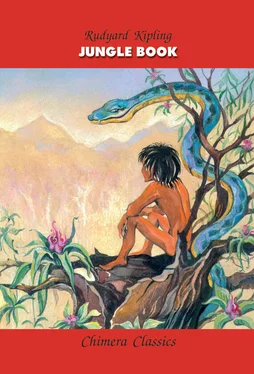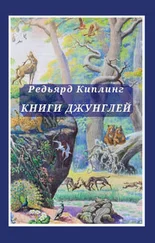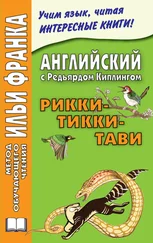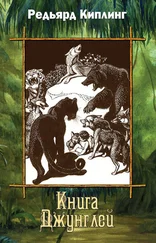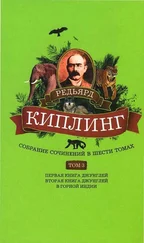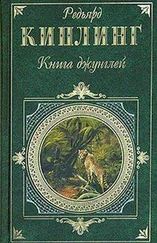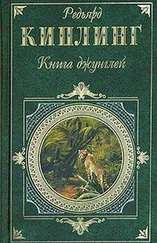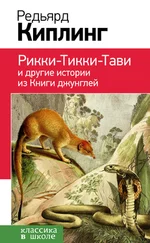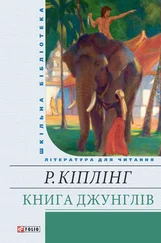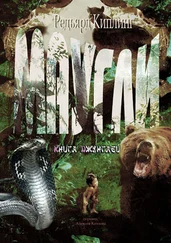Редьярд Киплинг - Jungle Book / Книга джунглей
Здесь есть возможность читать онлайн «Редьярд Киплинг - Jungle Book / Книга джунглей» — ознакомительный отрывок электронной книги совершенно бесплатно, а после прочтения отрывка купить полную версию. В некоторых случаях можно слушать аудио, скачать через торрент в формате fb2 и присутствует краткое содержание. Город: Санкт-Петербург, Год выпуска: 2003, ISBN: 2003, Издательство: Array Литагент «Антология», Жанр: foreign_prose, на английском языке. Описание произведения, (предисловие) а так же отзывы посетителей доступны на портале библиотеки ЛибКат.
- Название:Jungle Book / Книга джунглей
- Автор:
- Издательство:Array Литагент «Антология»
- Жанр:
- Год:2003
- Город:Санкт-Петербург
- ISBN:5-94962-016-X
- Рейтинг книги:3 / 5. Голосов: 1
-
Избранное:Добавить в избранное
- Отзывы:
-
Ваша оценка:
- 60
- 1
- 2
- 3
- 4
- 5
Jungle Book / Книга джунглей: краткое содержание, описание и аннотация
Предлагаем к чтению аннотацию, описание, краткое содержание или предисловие (зависит от того, что написал сам автор книги «Jungle Book / Книга джунглей»). Если вы не нашли необходимую информацию о книге — напишите в комментариях, мы постараемся отыскать её.
Jungle Book / Книга джунглей — читать онлайн ознакомительный отрывок
Ниже представлен текст книги, разбитый по страницам. Система сохранения места последней прочитанной страницы, позволяет с удобством читать онлайн бесплатно книгу «Jungle Book / Книга джунглей», без необходимости каждый раз заново искать на чём Вы остановились. Поставьте закладку, и сможете в любой момент перейти на страницу, на которой закончили чтение.
Интервал:
Закладка:
(and, oh, but I am old!)
Where roaring on the ledges
the summer ground-swell rolled;
I heard them lift the chorus that drowned
the breakers’ song —
The Beaches of Lukannon —
two million voices strong.
The song of pleasant stations beside
the salt lagoons,
The song of blowing squadrons that shuffled down
the dunes,
The song of midnight dances that churned the sea
to flame —
The Beaches of Lukannon – before the sealers came!
I met my mates in the morning
(I’ll never meet them more!);
They came and went in legions that darkened
all the shore.
And o’er the foam-flecked offing as far as voice
could reach
We hailed the landing-parties and we sang them up
the beach.
The Beaches of Lukannon —
the winter wheat so tall —
The dripping, crinkled lichens,
and the sea-fog drenching all!
The platforms of our playground,
all shining smooth and worn!
The Beaches of Lukannon —
the home where we were born!
I met my mates in the morning, a broken,
scattered band.
Men shoot us in the water and club us
on the land;
Men drive us to the Salt House like silly sheep
and tame,
And still we sing Lukannon – before the sealers came.
Wheel down, wheel down to southward;
oh, Gooverooska, go!
And tell the Deep-Sea Viceroys
the story of our woe;
Ere, empty as the shark’s egg
the tempest flings ashore,
The Beaches of Lukannon shall know
their sons no more!
«Rikki-Tikki-Tavi»
At the hole where he went in
Red-Eye called to Wrinkle-Skin.
Hear what little Red-Eye saith:
«Nag, come up and dance with death!»
Eye to eye and head to head,
(Keep the measure, Nag.)
This shall end when one is dead;
(At thy pleasure, Nag.)
Turn for turn and twist for twist —
(Run and hide thee, Nag.)
Hah! The hooded Death has missed!
(Woe betide thee, Nag!)
This is the story of the great war that Rikki-tikki-tavi fought single-handed, through the bath-rooms of the big bungalow in Segowlee cantonment. Darzee, the Tailorbird, helped him, and Chuchundra, the musk-rat, who never comes out into the middle of the floor, but always creeps round by the wall, gave him advice, but Rikki-tikki did the real fighting.
He was a mongoose, rather like a little cat in his fur and his tail, but quite like a weasel in his head and his habits. His eyes and the end of his restless nose were pink. He could scratch himself anywhere he pleased with any leg, front or back, that he chose to use. He could fluff up his tail till it looked like a bottle brush, and his war cry as he scuttled through the long grass was: «Rikk-tikk-tikki-tikki-tchk!»
One day, a high summer flood washed him out of the burrow where he lived with his father and mother, and carried him, kicking and clucking, down a roadside ditch. He found a little wisp of grass floating there, and clung to it till he lost his senses. When he revived, he was lying in the hot sun in the middle of a garden path, very draggled indeed, and a small boy was saying, «Here’s a dead mongoose. Let’s have a funeral».
«No», said his mother, «let’s take him in and dry him. Perhaps he isn’t really dead».
They took him into the house, and a big man picked him up between his finger and thumb and said he was not dead but half choked. So they wrapped him in cotton wool, and warmed him over a little fire, and he opened his eyes and sneezed.
«Now», said the big man (he was an Englishman who had just moved into the bungalow), «don’t frighten him, and we’ll see what he’ll do».
It is the hardest thing in the world to frighten a mon-goose, because he is eaten up from nose to tail with curiosity. The motto of all the mongoose family is «Run and find out», and Rikki-tikki was a true mongoose. He looked at the cotton wool, decided that it was not good to eat, ran all round the table, sat up and put his fur in order, scratched himself, and jumped on the small boy’s shoulder.
«Don’t be frightened, Teddy», said his father. «That’s his way of making friends».
«Ouch! He’s tickling under my chin», said Teddy.
Rikki-tikki looked down between the boy’s collar and neck, snuffed at his ear, and climbed down to the floor, where he sat rubbing his nose.
«Good gracious», said Teddy’s mother, «and that’s a wild creature! I suppose he’s so tame because we’ve been kind to him».
«All mongooses are like that», said her husband. «If Teddy doesn’t pick him up by the tail, or try to put him in a cage, he’ll run in and out of the house all day long. Let’s give him something to eat».
They gave him a little piece of raw meat. Rikki-tikki liked it immensely, and when it was finished he went out into the veranda and sat in the sunshine and fluffed up his fur to make it dry to the roots. Then he felt better.
«There are more things to find out about in this house», he said to himself, «than all my family could find out in all their lives. I shall certainly stay and find out».
He spent all that day roaming over the house. He nearly drowned himself in the bath-tubs, put his nose into the ink on a writing table, and burned it on the end of the big man’s cigar, for he climbed up in the big man’s lap to see how writing was done. At nightfall he ran into Teddy’s nursery to watch how kerosene lamps were lighted, and when Teddy went to bed Rikki-tikki climbed up too. But he was a restless companion, because he had to get up and attend to every noise all through the night, and find out what made it. Teddy’s mother and father came in, the last thing, to look at their boy, and Rikki-tikki was awake on the pillow. «I don’t like that», said Teddy’s mother. «He may bite the child». «He’ll do no such thing», said the father. «Teddy’s safer with that little beast than if he had a bloodhound to watch him. If a snake came into the nursery now —»
But Teddy’s mother wouldn’t think of anything so awful.
Early in the morning Rikki-tikki came to early breakfast in the veranda riding on Teddy’s shoulder, and they gave him banana and some boiled egg. He sat on all their laps one after the other, because every well-brought-up mongoose always hopes to be a house mongoose some day and have rooms to run about in; and Rikki-tikki’s mother (she used to live in the general’s house at Segowlee) had carefully told Rikki what to do if ever he came across white men.
Then Rikki-tikki went out into the garden to see what was to be seen. It was a large garden, only half cultivated, with bushes, as big as summer-houses, of Marshal Niel roses, lime and orange trees, clumps of bamboos, and thickets of high grass. Rikki-tikki licked his lips. «This is a splendid hunting-ground», he said, and his tail grew bottle-brushy at the thought of it, and he scuttled up and down the garden, snuffing here and there till he heard very sorrowful voices in a thorn-bush.
It was Darzee, the Tailorbird, and his wife. They had made a beautiful nest by pulling two big leaves together and stitching them up the edges with fibers, and had filled the hollow with cotton and downy fluff. The nest swayed to and fro, as they sat on the rim and cried.
«What is the matter?» asked Rikki-tikki.
«We are very miserable», said Darzee. «One of our babies fell out of the nest yesterday and Nag ate him».
«H’m!» said Rikki-tikki, «that is very sad – but I am a stranger here. Who is Nag?»
Darzee and his wife only cowered down in the nest without answering, for from the thick grass at the foot of the bush there came a low hiss – a horrid cold sound that made Rikki-tikki jump back two clear feet. Then inch by inch out of the grass rose up the head and spread hood of Nag, the big black cobra, and he was five feet long from tongue to tail. When he had lifted one-third of himself clear of the ground, he stayed balancing to and fro exactly as a dandelion tuft balances in the wind, and he looked at Rikki-tikki with the wicked snake’s eyes that never change their expression, whatever the snake may be thinking of.
Читать дальшеИнтервал:
Закладка:
Похожие книги на «Jungle Book / Книга джунглей»
Представляем Вашему вниманию похожие книги на «Jungle Book / Книга джунглей» списком для выбора. Мы отобрали схожую по названию и смыслу литературу в надежде предоставить читателям больше вариантов отыскать новые, интересные, ещё непрочитанные произведения.
Обсуждение, отзывы о книге «Jungle Book / Книга джунглей» и просто собственные мнения читателей. Оставьте ваши комментарии, напишите, что Вы думаете о произведении, его смысле или главных героях. Укажите что конкретно понравилось, а что нет, и почему Вы так считаете.
